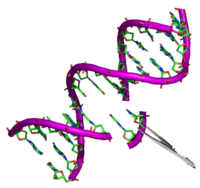
Photo from wikipedia
Chimeric antigen receptor (CAR) is an artificial protein that provides HLA-independent antigen specificity to T cells. CAR-T therapy has shown remarkable clinical responses especially in hematologic malignancies. But this therapy… Click to show full abstract
Chimeric antigen receptor (CAR) is an artificial protein that provides HLA-independent antigen specificity to T cells. CAR-T therapy has shown remarkable clinical responses especially in hematologic malignancies. But this therapy requires cell preparation for each patient and it cause some limitations for applicability of CAR-T therapy. We have reported regeneration of T cells from iPSCs ( Cell Stem Cell. 2013). Since this technology can provide unlimited number of T cells, CAR-T therapy using iPSCs is thought to broaden its applicability. To target solid tumors, it is important to avoid immunosuppressive factors from tumor microenvironment and to exert sufficient cytotoxicity. Tumor reactive T cells are known to fall into anergy state by continuous antigen stimulations. To overcome immunosuppression in tumor microenvironment, enhancement of TCR signaling by modification of genes related to TCR signal is a promising strategy. Recent studies revealed that the efficacy of CAR-iPS-T cells are not equivalent to primary CAR-T cells. To enhance the efficacy of CAR-iPS-T cells and to produce resistant CAR-T cells to immunosuppression, we focused on TCR signaling pathway. We found that antigen reactivity of CAR-iPS-T cells was insufficient compared with primary CAR-T cells. To overcome the weakness of TCR signal, we disrupted genes negatively related to TCR signal and successfully enhanced TCR signal. As a result, genome edited CAR-iPS-T cells could persist longer in vivo and displayed enhanced tumor suppressive function comparable with primary CAR-T cells. Genome edited iPSCs can be a unlimited cell source of enhanced CAR-T cells. These findings indicate that regenerated CAR-T cells derived from genome edited iPSCs would be a promising CAR-T therapy which would overcome immunosuppressive tumor microenvironment. Citation Format: Tatsuki Ueda, Shoichi Iriguchi, Yohei Kawai, Atsutaka Minagawa, Hiroyuki Miyoshi, Seitaro Terakura, Yasushi Uemura, Knut Woltjen, Yuzo Kodama, Hiroshi Seno, Yasumichi Hitoshi, Tetsuya Nakatsura, Koji Tamada, Shin Kaneko. Enhanced effector responses of regenerated CAR-T cells derived from genome edited iPSCs [abstract]. In: Proceedings of the American Association for Cancer Research Annual Meeting 2019; 2019 Mar 29-Apr 3; Atlanta, GA. Philadelphia (PA): AACR; Cancer Res 2019;79(13 Suppl):Abstract nr 1432.
Journal Title: Cancer Research
Year Published: 2019
Link to full text (if available)
Share on Social Media: Sign Up to like & get
recommendations!